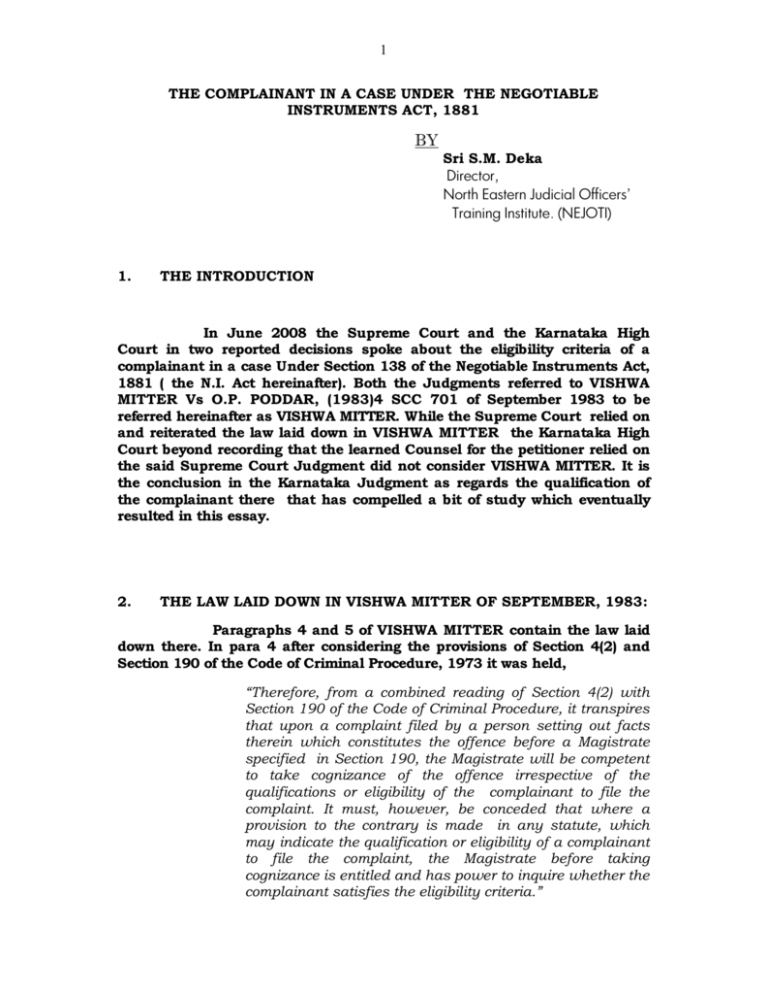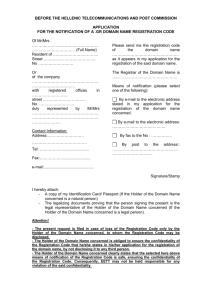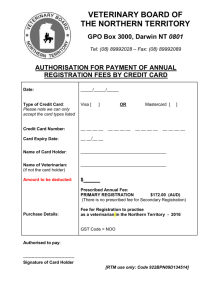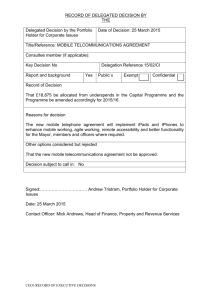the complainant in a case under the negotiable instruments act, 1881
advertisement

1 THE COMPLAINANT IN A CASE UNDER THE NEGOTIABLE INSTRUMENTS ACT, 1881 BY 1. Sri S.M. Deka Director, North Eastern Judicial Officers’ Training Institute. (NEJOTI) THE INTRODUCTION In June 2008 the Supreme Court and the Karnataka High Court in two reported decisions spoke about the eligibility criteria of a complainant in a case Under Section 138 of the Negotiable Instruments Act, 1881 ( the N.I. Act hereinafter). Both the Judgments referred to VISHWA MITTER Vs O.P. PODDAR, (1983)4 SCC 701 of September 1983 to be referred hereinafter as VISHWA MITTER. While the Supreme Court relied on and reiterated the law laid down in VISHWA MITTER the Karnataka High Court beyond recording that the learned Counsel for the petitioner relied on the said Supreme Court Judgment did not consider VISHWA MITTER. It is the conclusion in the Karnataka Judgment as regards the qualification of the complainant there that has compelled a bit of study which eventually resulted in this essay. 2. THE LAW LAID DOWN IN VISHWA MITTER OF SEPTEMBER, 1983: Paragraphs 4 and 5 of VISHWA MITTER contain the law laid down there. In para 4 after considering the provisions of Section 4(2) and Section 190 of the Code of Criminal Procedure, 1973 it was held, “Therefore, from a combined reading of Section 4(2) with Section 190 of the Code of Criminal Procedure, it transpires that upon a complaint filed by a person setting out facts therein which constitutes the offence before a Magistrate specified in Section 190, the Magistrate will be competent to take cognizance of the offence irrespective of the qualifications or eligibility of the complainant to file the complaint. It must, however, be conceded that where a provision to the contrary is made in any statute, which may indicate the qualification or eligibility of a complainant to file the complaint, the Magistrate before taking cognizance is entitled and has power to inquire whether the complainant satisfies the eligibility criteria.” 2 The Supreme Court by way of illustrating the point then indicated cases covered by the provisions of Section 195(1), 195(2), 198 and 199 of the Code of Criminal Procedure, 1973 prescribing qualifications or eligibility criteria for the complainant under those provisions. Section 20 of the Prevention of Food Adulteration Act, 1954 and Section 621 of the Companies Act 1956 were also mentioned by way of illustration and then the law is summarised thus in para 5 : “ It is thus crystal clear that anyone can set the criminal law in motion by filing a complaint of facts constituting an offence before a Magistrate entitled to take cognizance under Section 190 and unless any statutory provision prescribes any special qualification or eligibility criteria for putting the criminal law in motion, no court can decline to take cognizance on the sole ground that the complainant is not competent to file the complaint . ....... But where any special statute prescribes offences and makes any special provision for taking cognizance of such offences under the statute, the complainant requesting the Magistrate to take cognizance must satisfy the eligibility criteria prescribed by the statute”. 3. THE SUPREME COURT IN SHANKAR FINANCE AND INVESTMENTS –Vs- STATE OF ANDHRA PRADESH AND OTHERS, (2008)8 SCC 536 OF JUNE, 2008. “Special Statute” involved in SHANKAR FINANCE (Supra) from the Supreme Court is the N.I. Act and the “Special Provision” is the provision of Section 142(a) of the N.I. Act which is this: “Notwithstanding anything contained in the Code of Criminal Procedure, 1973(2 of 1974)- (a) No court shall take cognizance of any offence punishable under Section 138 except upon a complaint, in writing, made by the payee or, as the case may be, the holder in due course of the cheque;” The complainant there was a sole proprietary concern in the name and style of M/s Shankar Finance and Investments owned by one Atmakuri Sankar Rao, who executed a power of attorney in favour of Sri 3 Thamada Satyanarayana. The substance of the description of the complainant would read thus : - M/s Shankar Finance and Investments, a proprietory concern of Atmakuri Sankar Rao, represented by Sri Thamada Satyanarayana. The complaint was signed by Thamada Satyanarayana and he also was examined under Section 200 of the Code of Criminal Procedure, 1973. Eventually the High Court quashed the complaint on the ground that the same was not signed by the complainant/payee of the cheque. The High Court also found irregularity in examining on oath the power of attorney holder. The Supreme Court quoted from VISHWA MITTER, RAM CHANDRA PRASAD SHRMA –VS- STATE OF BIHAR, AIR 1967 S.C. 349 AND JANKI VASHDEO BHOJWANI –VS- INDUSIND BANK LTD., (2005)2 SCC 217 then rejected both the points indicated above which found favour with the High Court. Paragraphs 10, 11 and 15 of this Judgment of the Supreme Court are most instructive. A summary of the law laid down would read thus :(1) A proprietary concern is nothing but an individual trading in a trade name. In civil law such a concern cannot sue in the trading name but must sue in his own name, though others can sue him in the trading name. Had this been a civil suit the proper description of the plaintiff should be “Atmakuri Sankar Rao carrying on business under the name and style of M/s Shankar Finance and Investments, a sole proprietary concern.” Since this is a criminal complaint under the special requirements of Section 142 of the N.I. Act the payee M/s Shankar Finance and Investment can itself be the complainant. (2) Where the proprietary concern, as in the case in hand, carries on business through a power of attorney holder the complaint, in case of a payee can be validly filed by describing the complainant in any one of the four methods as follows : (a) The proprietor of the proprietary concern describing himself as the sole proprietor of the “payee”. (b) The proprietary concern, describing itself as a sole proprietary concern, represented by its sole proprietor. (c) The proprietor represented by his power-of-attorney holder. (d) The proprietary concern of the proprietor represented by his power of attorney holder. 4 (3) The complaint would be bad if the power-of-attorney holder files the complaint in his own name as if he is the complainant. (4) Where the power-of-attorney holder is in charge of the business of the complainant and alone is personally aware of the transaction and the complaint is signed by the attorney holder on behalf of the complainant payee the power-of-attorney holder can depose for the complainant payee. What has been said in respect of a payee/complainant can also be applied to a holder in due course/complainant. Thus though Section 142(a) of the N.I. Act mentions only two entities that is the payee and the holder in due course as the complainant, the complaint in a given case may also be filed by these two entities through the power-of-attorney holders of either of them in each case. 4. THE KARNATAKA HIGH COURT IN SRI ASHOK KUMAR –VS- DR. T.R. BHAGEERATHI, 2008(6) AIR Kar R 219 OF JUNE 2008. The decision will be referred hereinafter as ASHOK KUMAR. A cheque for consideration received issued in favour of A.G. Sadananda Bhat by Sri Ashok Kumar on presentation was returned unpaid for want of funds. The fact of dishonour was intimated to the payee A.G. Sadananda Bhat by his Bankers on 09.05.2005. On 14.05.2005 A.G. Sadananda Bhat got issued the required demand notice and on 15.05.2005 he died. The wife of the deceased payee Dr. T.R. Bhageerathi then filed the complaint for an offence under Section 138 of the N.I. Act on which cognizance was taken by the Magistrate by Order dated 11.10.2005. This order was challenged in the High Court. The High Court found nothing wrong in the order taking cognizance and dismissed the criminal petition. The High Court’s reasonings stated in para 9 of the Judgment proceed thus :“Section 8 of the Act defines “Holder” means any person entitled in his own name to the possession thereof and to receive or recover the amount under the instrument from the drawer. Therefore the legal representative of a payee or holder in due course are entitled to legal possession of the instrument and further to receive and recover the amount covered under the instrument from the drawer. Section 118(g) of the Act specifies that holder of a negotiable instrument is a holder in due course. Therefore the legal representatives of deceased payee or holder in due course are entitled to file a complaint under Section 5 142 of the Act for offence punishable under Section 138 of the Act.” Even at the first blush the reasoning as above appears to be fallacious. However a detailed analysis of the reasoning may be undertaken before finally reaching a conclusion either way. 5. ANALYSIS OF THE REASONINGS IN ASHOK KUMAR, 2008(6) AIR Kar 219, ILR 2008 KAR 3865, MANU/KA/0277/2008 The N.I. Act is a statute dealing with Promissory Notes, Bills of Exchange and cheques and is essentially a statute concerned with civil liability flowing from making and negotiating the Notes, Bills and cheques. The object and the purpose of the N.I. Act is to codify the customary law and principles prevalent during the Middle ages in the commercial world conveniently called the law merchant so as to facilitate commerce. Only with effect from 01.04.1989 the new Chapter XVII in the N.I. Act creating the offence under Section 138 and other relevant procedural provisions among them Section 142(a) were substituted in the N.I. Act. At this stage it will be useful to quote from BHASHYAM & ADIGA’s classic The Negotiable Instruments Act, 18th Edition 2008 at page 741 – “The offence under Section 138 is not a natural crime like hurt or murder. It is an offence created by a legal fiction in the Statute. It is a civil liability transformed into a criminal liability, under restricted conditions by way of an amendment to the Act, which is brought into force only in 1989. Till then the offending acts referred to in Section 138 constituted only a pure civil liability.” Courts often fail to keep this origin of the offence in mind and to distinguish civil liability and the “restricted condition” of the criminal liability of the offence. It is obvious from the passage quoted from the judgment that ASHOK KUMAR suffers from this malady. It is unfortunate that though the learned counsel for the petitioner there relied on VISHWA MITTER the High Court beyond recording the fact of reliance did not find it necessary to advert to VISHWA MITTER. Had that been done, it is possible that the High Court instead of beginning the reasoning from the definition of “Holder” and reaching “Holder in due course” via Section 118(g) would have straightway begun from the “Special provision” of Section 142(a). In such a case the definition of “Holder in due course” would have been at the core of the reasoning. Reasoning in ASHOK KUMAR quoted in paragraph 4 of this essay would be appropriate for a civil suit filed by Dr.T.R. Bhageerathi, the wife of the deceased payee of the cheque, A.S. Sadananda Bhat to recover the amount mentioned in the cheque. The matter of the civil liability of the drawer of the cheque towards the legal 6 representative of the payee or of the holder-in-due course would be considered a little latter. “ Holder in due course” has been defined in Section 9 of the N.I. Act. For the present purpose the key elements of the definition are the following three : – (1) the person must be the possessor of the cheque for consideration if it is a bearer cheque ; or (2) the person must be the payee if the cheque is payable to order; or (3) the person must be the indorsee thereof if the cheque is payable to order Section 13, 14, 15 and 16 of the N.I. Act explain the meanings of Negotiation, Bearer cheque, cheque payable to order, indorsement and indorsee. In ASHOK KUMAR the correct question to ask is- is the wife of A.S. Sadananda Bhat that is Dr. T.R. Bhjageerathi either the payee or the possessor for consideration or the indorsee of the cheque. Going by the facts narrated in the Judgment the cheque being payable to order the more pointed question will be is the wife the payee or the indorsee. A.S. Sadananda issued the notice of demand on 14.05.2005 and died and 15.05.2005. On these facts the answer cannot but be that the complainant answering positively none of the said three questions cannot be within the special provisions of Section 142(a) of the N.I. Act and a complaint under Section 138/142 of the N.I. Act filed by her would be incompetent. Dr. T.R. Bhageerathi the wife of the deceased payee is no doubt a legal representative of the deceased. She came into possession of the cheque not via the route provided by the provisions of the N.I. Act being neither the payee nor the possessor for value nor being an indorsee. She came into possession of the cheque under the general law of devolution as an heir. The route starting with the definition of “Holder” in Section 8 of the N.I. Act also has not been adequately traversed and closely followed by the High Court. Mere possession of a Note or Bill or a cheque does not make one a “Holder” within Section 8 of the N.I. Act. The key ingredient of being a “Holder” within Section 8 of the N.I. Act is “entitlement to possess in his own name”. A payee obviously is so entitled. Other than the payee the instrument must be negotiated either by delivery within Sections 46 and 47 of the N.I. Act or by delivery and indorsement within Section 46, 47 and 48 of the N.I. Act depending on the nature of the instrument. The dates of the crucial events in the case already indicated leave no room for doubt that there could not have been any form of negotiation of the cheque in favour of Dr. T.R. Bhageerathi. She does not qualify even as a “Holder”. In the circumstances the question of her being a “Holder in due course” through the presumption under Section 118 (g) of the N.I. Act, therefore, does not at all arise. 7 Even on the civil liability of Ashok kumar, the drawer of the cheque towards Dr. T.R. Bhageerathi considerable conflict among several decisions of different High Courts exists. This was the result of bestowing wider meaning to the facts and words used in SADASUK JANAKI DAS –VSKISHEN PARSHAD, AIR 1918 P.C. 146. Fortunately law in this regard is finally settled through decisions like Full Bench decision of the Allahabad, Madrass, Punjub High Court as well as several Division Bench decisions of many High Courts most eloquent among them would be the one by the Rajasthan High Court and the Single Bench decision of the Madhya Pradesh High Court. These decisions are RAI RAM KISHORE –VS- RAM PRASAD, AIR 1952 Allahabad 245 (FB), MUTHUVEERAN CHETTY –Vs- GOVINDAN CHETTY, AIR 1961 Mad 518 (FB) and PADAM PARSHAD –Vs- LOK NATH, AIR 1964 Punjub 497 (FB), BHAGIRATH –Vs- GULAB KANWAR, AIR 1956 Rajasthan 174(DB) and CHAMPALAL –Vs PADAM CHAND, AIR 1971 M.P. 133. A summary of the law deducible from the above decisions would read thus :- The N.I. Act deals with transfer of negotiable Instruments that is Notes, Bills and Cheques through modes of negotiation prescribed there. But the N.I. Act does not affect the operation of the general law of devolution or transfer by act of parties provided in Section 130 of the Transfer of Property Act. When the instrument is negotiated under the N.I. Act the prescriptions of the N.I. Act have to be followed. But when the transfer or assignment is under general devolution or under a law like the Transfer of Property Act no negotiation under N.I. Act is necessary and a Suit to recover the amount covered by the instrument by the legal representative or heir of the payee/Holder is maintainable. Though the decision is of marginal relevance for the present purpose the Supreme Court’s views about the “Holder” and “Holder in due course” in relation to cheques and their right to sue can be read in U. PONNAPPA MOOTHAN SONS –Vs- CATHOLIC SYRIAN BANK LTD., (1991) 1 SCC 113. The distinction both substantive and procedural between civil action and criminal action indicated in SHANKAR FINANCE (Supra) and the supremacy of the special restrictive qualification of the complainant under the special statute enunciated in VISHWA MITTER have not been kept in focus in deciding ASHOK KUMAR by the High Court. It may not be irrelevant to mention here that way back in September 1958 the Law Commission headed by M.C. Setalvad submitted its 11th Report dealing with the N.I. Act. Paragraphs 45 to 51 of the Report contain a very detailed discussion on the “Holder” and “Holder-in- due course” A revised draft of the definitions was proposed. Two excerpts from the Report are very instructive. They are these :(1) It, may, however, be observed at the outset that the changes introduced do not seek to alter the law but to obviate the conflict of judicial opinions and the criticism of commentators which the existing definition has given rise to.” 8 (2) “The right of negotiation is conferred by the Act only upon a maker, drawer payee or indorsee (vide Section 51) and in the case of bearer instrument upon the bearer. In the case of an instrument payable to order, section 48 lays down that it is negotiable by a “holder” by indorsement and delivery thereof. The “holder” in this context does not mean an assignee or a person who has acquired rights under the instrument by legal devolution ………………” is this : The new definition of “Holder” suggested by the Law Commission “(12) Holder means the payee, or indorsee of the instrument or the bearer thereof, but does not include a beneficial owner claiming through a benamidar”. A suggested new addition to the definitions is this :“(6) Bearer means a person who by negotiation comes into possession of an instrument payable to bearer. Had these suggestions in accordance with the similar provisions in the English Bills of Exchange Act, 1882 been accepted and enacted into the N.I. Act it would surely have served to relieve the confusion in ASHOK KUMAR as to the “Holder”. In ASHOK KUMAR the High Court relied on PUNJUB & SIND BANK –Vs- VINKAR SAHAKARI BANK LTD, (2001)7 SCC 721 cited by the learned counsel for the complainant Dr. T.R. Bhageerathi. After excerpting paragraph 21 and 22 of the above noted Supreme Court Judgment the High Court in para 11 of the judgment spoke thus :“Though the facts in Punjub and Sind Bank’s case are different , the ratio is that the “holder” of an instrument shall be presumed to be a “holder in due course” until the contrary is proved. Therefore in the instant case the respondent claiming to be the wife of the deceased payee filed the complaint under Section 142 of the Act before the trial court and the same is maintainable until the contrary is proved. The principal question before the Supreme Court in (2001)7 SCC 721 was whether dishonour of a pay order, other requisites being fulfilled, may sound in a complaint under Section 138 of the N.I. Act . Insimpler terms the question was whether a “pay order” is a “cheque” within Section 6 of the N.I. Act. The Supreme Court answered the question in the affirmative. In that case it was “undisputed that the complainant Company is the holder of the instrument on its own right” (vide para 23 of the Supreme Court Judgment). 9 The relevant inscriptions of the pay order in question has been quoted in para 3 of the Supreme Court Judgment thus : “Payee’s account only - To pay Punjub and Sind Bank – M/s Poise Leasing and Finance Company Ltd or order.” All these have not been noticed in ASHOK KUMAR and extracts from the Supreme Court Judgment have been quoted out of context. The extracts read in the context detailed above when applied to ASHOK KUMAR would not bestow the qualifications of a “Holder” on Dr. T.R. Bhageerathi the complainant in the case before the High Court. The route via Section 118(g) indicated in (2001)7 SCC 201 from “Holder” to being a “Holder in due course” to maintain the criminal complaint is thus not available to the complainant. The Writer was not able to discover and peruse any decision of other High Courts or the Supreme Court where on the death of a payee an heir had filed a complaint and such a complaint had been held to be maintainable. However BHASHYAM & ADIGA’s celebrated Book on the Negotiable Instruments Act, eighteenth Edition 2008 at page 848 Synopsis 112 dealt with the question thus :“ A combined reading of Sections 138 and 142 makes it clear that it is only the payee or the holder in due course of the cheque in question who can file a complaint under these Sections, and that too after a notice demanding payment is issued to the drawer of the cheque. A payee is defined in Section 7 as a person named in the instrument, to whom or to whose order the money is, by the instrument, directed to be paid. For a person to be holder in due course, he must come into possession of the instrument for consideration. The respondent, as the executor of the will of his father, to whom the cheque in question had been issued, was neither the payee nor the holder in due course, as there was nothing to show that he had paid any consideration to his father and was not entitled to file the complaint in question in respect of the cheque.” The last sentence in the above extract is a digest of a decision KOYA MOIDEEN (PK) –Vs- HARIHARAN (G), (1996)86 Comp Cas 399(Ker). This is the closest case on facts except that no will is involved in ASHOK KUMAR which is a case of intestate succession. 6. THE CONCLUSION The upshot of the preceding considerations has to be that the first blush impression recorded earlier is valid. ASHOK KUMAR, in that view, has not been correctly decided. The complaint, in question, filed by the wife on the death of the payee is not competent. 10




